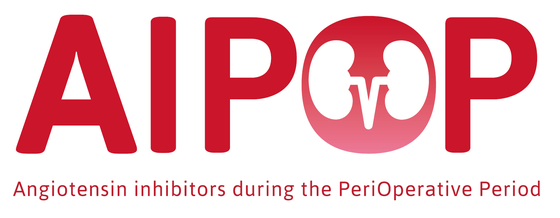AIPOP: Management of angiotensin inhibitors during the perioperative period
AIPOP: Management of angiotensin inhibitors during the perioperative period
AIPOP: Management of angiotensin inhibitors during the perioperative period.
We are researching whether patients who use angiotensin inhibitors for the treatment of hypertension, may continue using these specific types of medicine if they undergo surgery, or if these should temporarily be stopped. At the moment, we do not know what is best to prevent too high or too low blood pressures surrounding surgery. This is important to prevent damage to organs, such as the kidneys, heart and brain.
Many patients use medication daily to treat high blood pressure. One group of drugs that is often used are angiotensin inhibitors, such as Enalapril, Lisinopril, Fosinopril, Candesartan, Losartan and Valsartan.
In the long term, these drugs lead to less disease and death caused by cardiovascular disease. However, when patients take these drugs and have to undergo surgery, the blood pressure can become too low. Then, complications can arise that have to do with low blood pressure. In the worst-case scenario, this causes damage to, for example, the kidneys, heart and brain. On the other hand, when the medication is temporarily stopped, high blood pressure can also lead to complications. For example, this can lead to damage to the heart. Therefore, it is necessary to consider before surgery, whether these drugs should be continued or temporarily stopped in the perioperative period.
It is an experimental study, in which patients continue or temporarily stop using the angiotensin inhibitor. This study requires a total of 3,200 patients from multiple hospitals.

What is the purpose of this study? uitklapper, klik om te openen
It may be better to temporarily stop using these drugs in the perioperative period, but this is it not yet clear. As a result, hospitals and even doctors use different policies: one doctor stops the drugs before surgery, and another doctor advises the medication to be continued. Therefore, the aim of this research is to find out what is better (to stop or to continue) and which leads to the fewest complications. We do this by making one group continue the angiotensin inhibitor, , whilst another group temporarily stops taking this medication. Then, in both groups, we look at how these patients are doing at three months after surgery and if complications have occurred.
Who can participate in this study? uitklapper, klik om te openen
Patients who can participate:
All patients who chronically use an angiotensin inhibitor (as described above) for the treatment of high blood pressure, and who are scheduled to undergo major surgery can participate in this study.
Patients who cannot participate:
All patients with severe renal impairment or heart failure, who recently suffered from a heart attack, who will have organ transplantation, , who use specific other blood pressure lowering medication, , and who do not manage their medication themselves cannot participate in this study.
What does participation in this study entail? uitklapper, klik om te openen
The following is expected of you in this study:
Before surgery:
- You are asked to fill out two short surveys (digitally or over the phone)
- You are asked to fill out a medication diary one week prior to surgery
- Depending on the group you are assigned, you will be instructed to take or not to take your blood pressure lowering medication.
During the admittance to the hospital in the perioperative period:
- Depending on the group you are assigned, you will be asked to take or not to take your blood pressure lowering medication on the 2 days after surgery.
- Just before and on the first 2 days after surgery, a single vial of blood will be taken 3 times in total.
After discharge from the hospital:
- One vial of blood will be drawn on the day you come for a check-up to the hospital.
- 4 weeks after surgery, you are asked to fill out two short surveys (digitally or over the phone)
- 3 months after surgery, you are asked to fill out four short surveys (digitally or over the phone)
- During these 3 months after surgery, you are asked to keep the wrapping of the blood pressure lowering medication, and to send those to us in a provided envelope.
Who are the researchers? uitklapper, klik om te openen
The research team consists of:
UMC Utrecht
Dr. Judith van Waes, anesthesiologist (principal investigator)
Prof. dr. Wilton van Klei, anesthesiologist
Dr. Lynn Miggelbrink, resident anesthesiology and PhD student
Research nurses from the Anesthesiology Trial Office
Amsterdam UMC
Prof. Dr. Markus Hollmann, anesthesiologist
Eline de Klerk, research coordinator
Antonius Hospital Nieuwegein
Dr. Eric van Dongen, anesthesiologist
Catharina Hospital Eindhoven
Dr. Leon Montenij, anesthesiologist
Erasmus Medical Center Rotterdam
Dr. Felix van Lier, anesthesiologist
Maastricht UMC
Prof. Dr. Wolfgang Buhre, anesthesiologist
Dr. Dianne de Korte, epidemiologist
Who is financing this study? uitklapper, klik om te openen
The UMC Utrecht (The Netherlands) is the sponsor of this research project. It will be carried out in several hospitals, and is funded by a grant from ZonMw, program ‘Goed Gebruik Geneesmiddelen’ (project number 848018007) .

Patient participation uitklapper, klik om te openen
The study information was written in collaboration with our experience experts from the ‘College van Ervarings deskundigen’ from the ‘Harteraad’, and the UMC Utrecht Patient Panel.

